People love kittens. They’re playful, small, and, most importantly, adorable. Almost everyone wants a kitten. However, the question is: are kittens a lot of work? Simply speaking, kittens are a lot more work when compared to adult cats. Raising a kitten properly will definitely require more time, effort, knowledge, and money.
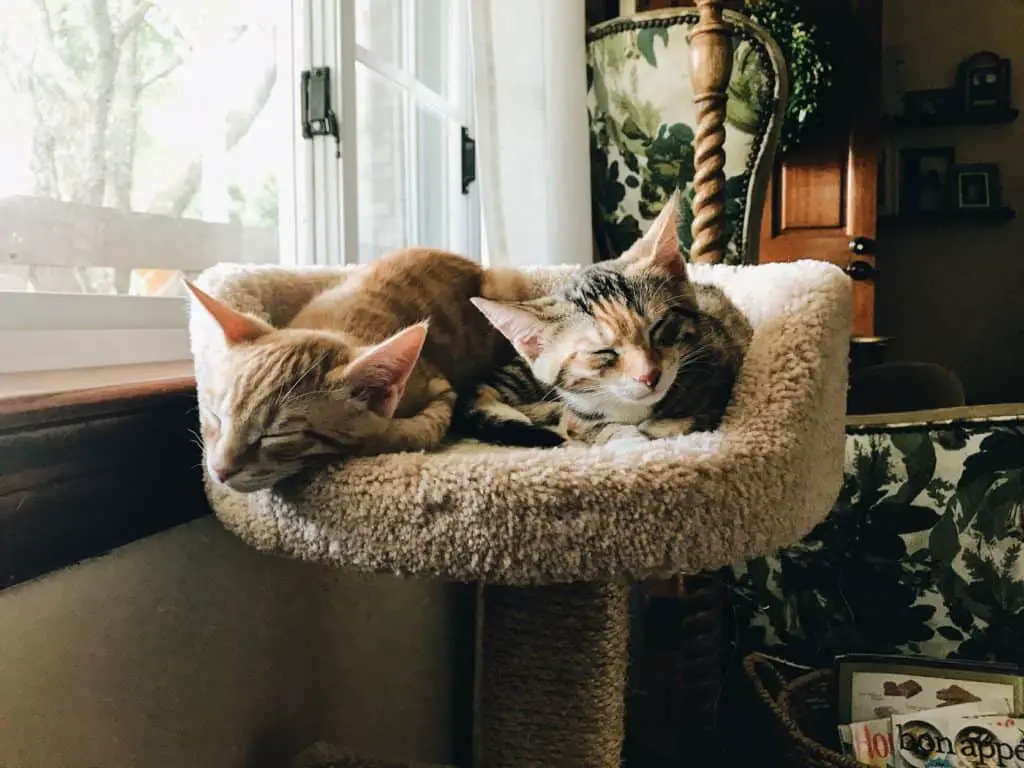
Kittens not only require more maintenance (health, behaviors, & socialization) to become well-rounded cats, but they are quite a bit more susceptible to illnesses and diseases. Also, because they require vaccines and eventually to be sterilized (neutered or spayed), the cost of owning a kitten can be surprising to some owners.
Responsibilies and Attention Required to Raise a Kitten: Quick Chart
| Approximate Age of Kitten | Attention Required (Time & Responsibilities) |
|---|---|
| Newborn | Round-the-clock attention: feeding (every 2 hours), eliminating, regulating body temperature. |
| 1-3 Weeks | High attention required: feeding every 3-4 hours, eliminating, regulating body temperature. |
| 3-5 Weeks | High to moderate attention required: introduction to the litter box, feeding every 5-6 hours. |
| 6-8 Weeks | High to moderate attention required: important socialization period. |
| 9-12 Weeks | Moderate attention required: transition period to solid foods, super energetic. |
| 3-6 Months | Low to moderate attention required: neuter/spay period, behavior correcting. |
| 6+ Months | Low to moderate attention required: transition period to a fully grown adult cat. |
For a more detailed explanation of the responsibilities, see the sections below!
Responsibilies and Attention Required to Raise a Kitten: Detailed Explanations
Hopefully, kittens that are very young (newborn to 1-3 weeks old) will have their mothers around to keep them well-fed and warm. Not to mention, their mother will be able to teach them all the things that a cat should learn to do or not do. This is why many experts suggest that kittens should be left with their mothers until a certain time period.
However, there are times when the mother is absent, which means a lot more work and effort will be needed to keep the kitten healthy and well cared for. It’s possible, but know that it’s a lot of work for very young kittens.
Responsibilities: Kittens Newborn
These are also known as neonatal kittens, and every bit of attention should be given to ensure they are adequately cared for. It is important to remember that newborn kittens cannot take care of themselves in any way, shape, or form. They are unable to eat solid foods and are not capable of peeing and pooping on their own. Newborn kittens can get chills easily, which can be life-threatening, so ensure that any newborn kitten is kept warm.
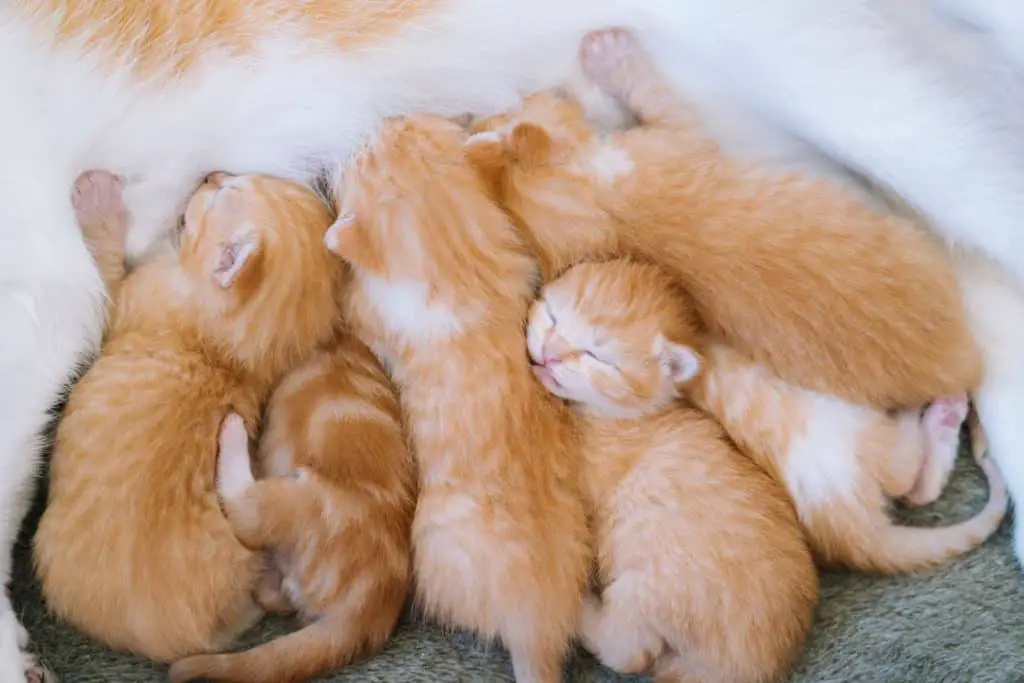
Newborn kittens cannot control their body temperature until at least 21 days (3 weeks), so it is vital that if there is no mother cat, you use your own body heat to keep the kitten warm and gently rub the kitten to aid with blood circulation.
It would be best to build a warm nest with a heating pad and is covered by a towel at home. Please ensure that the kitten is able to move away from the heat should it desire. Keep the bedding dry and clean up any accidents. Do not engage in any bottle feeding until the kitten has totally warmed up. Never feed any cow or goat milk to a newborn kitten as it will give them diarrhea. You should also aim to feed the kitten every 2 hours for the first 10 days.
Responsibilities: Kittens 1-2 Week Old
Kittens emerge into the world with both their eyes and ears shut and, as a result, spend the first week of their life being both deaf and blind. When their eyes do finally open, usually around the 2-week mark, their vision will be blurry, and as a result, they should be kept away from any bright lights as this could harm their future eyesight.
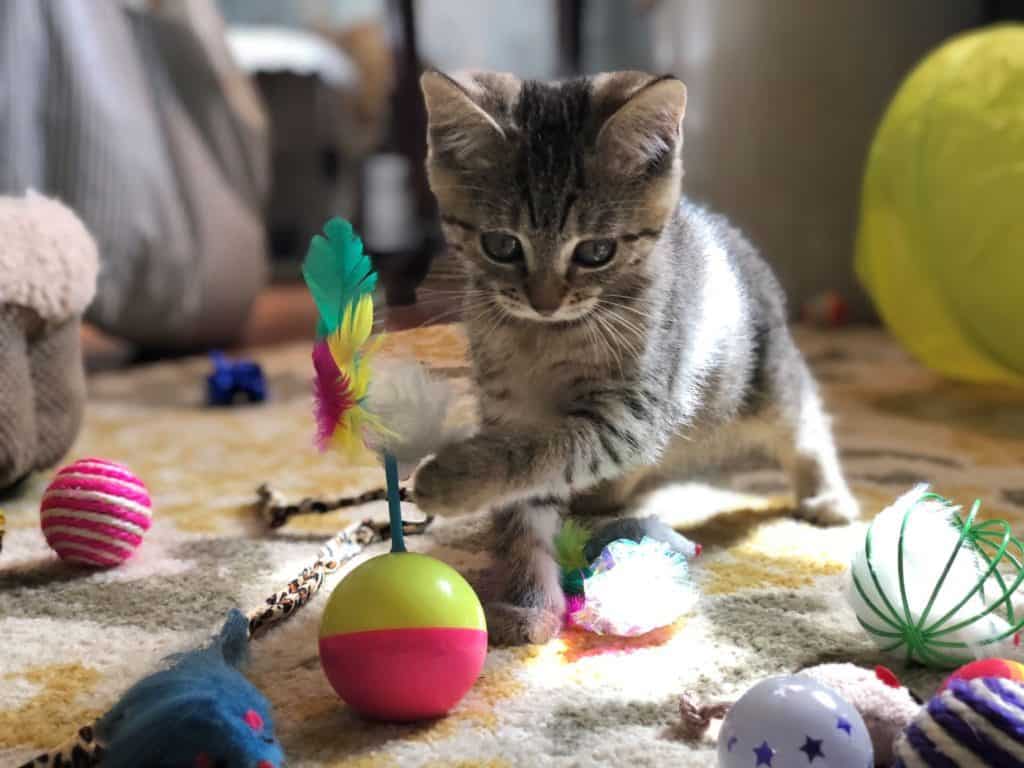
All cats are born with blue eyes because they don’t develop pigmentation until further down the line. You should notice that around the 3-week mark is when your kitten’s eyes will open. Coincidentally, their ears open around the same time, exposing them to a world of sound. Kittens have the ability to make sounds from birth (small mews) which is necessary when they need to signal that they are hungry. You should aim to feed the kitten, if a mother cat is absent, every 3 to 4 hours.
Responsibilities: Kittens 3-5 Week Old
Around the 3-week mark, you will start to hear small purrs emanating from your kitten, and what a sweet sound it is. It is also around this time that your kitten will be taking its first tentative steps into a new world, although they will be quite wobbly and shaky.
As they start to walk more (week 4), their balance will become more assured, and they will want to start exploring their new surroundings. If you haven’t already, then now is the time to start kitten proofing your home or at the very least having a designated area where your kitten can roam but free of any danger.
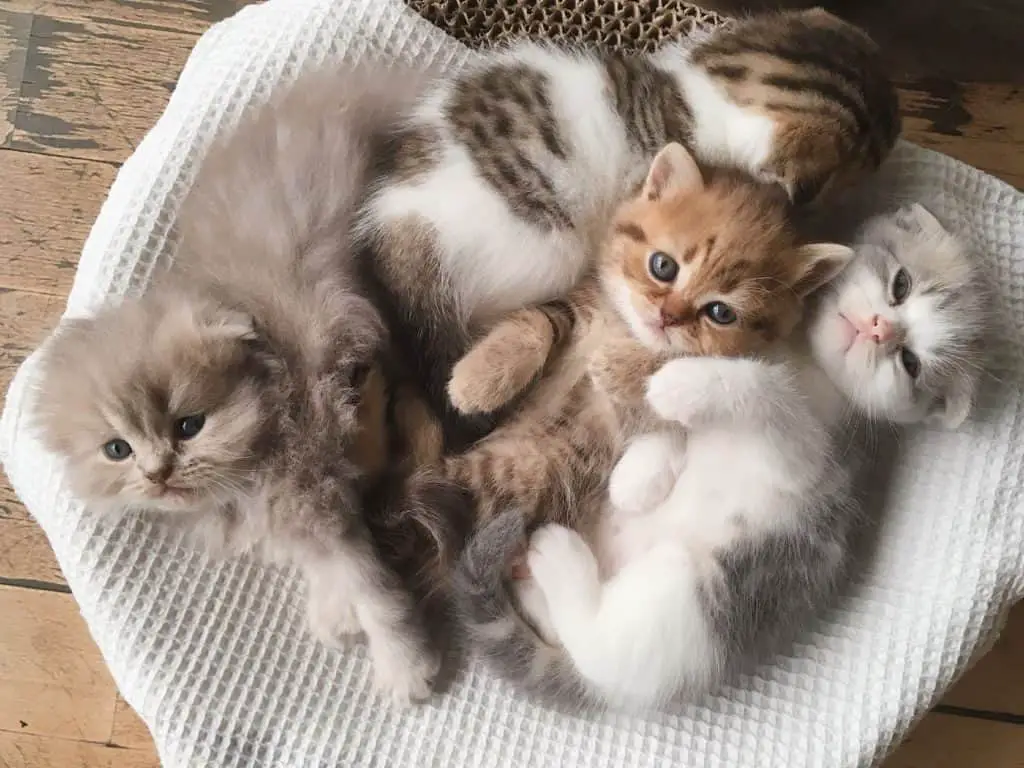
Weeks 4 and 5 will see your kitten start to eliminate without the assistance of their mother. This is the perfect opportunity to introduce the litter box. Kittens learn from watching their mother, so the most you should need to do is show them the litter box (remember to keep it clean). Accidents are still likely to occur, so bear this in mind. Feed them every 5 to 6 hours up to the 4-week mark. From 4 weeks on, you can feed them 2 to 3 times a day.
Responsibilities: Kittens 6-8 Week Old
Your kitten will be using its newfound confidence and mobility to move around and explore. This is a great time to start introducing them to other pets and people. Please make sure you spend plenty of time playing and cuddling your kitten as well as letting them roam their new surroundings (be sure to keep an eye on them, though).
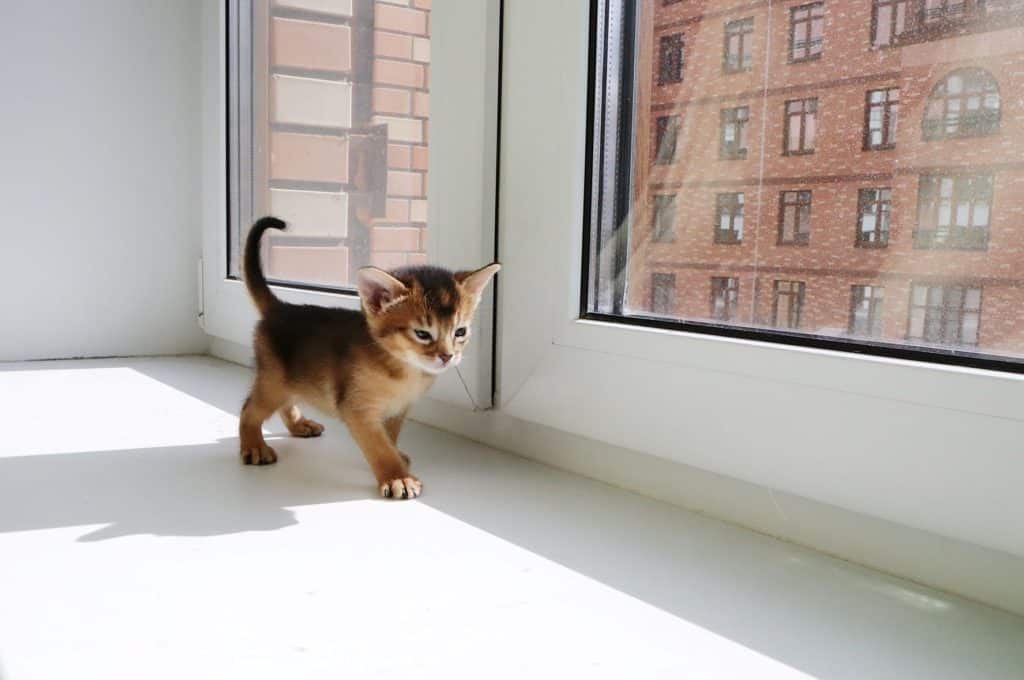
It is important you allow the kitten to explore for it to start using its senses (sight, sound, smell, etc.), as this will allow it to grow into a healthy and confident cat. This is especially important if you are preparing the kitten to move to a forever home.
Around the 6-week mark, you should aim to take your kitten for its first set of vaccinations. You should also notice that your kitten has a full set of baby teeth. Just like with humans, these will eventually be replaced by adult teeth, but not until a little later.
Responsibilities: Kittens 9-12 Week Old
You can start introducing solid kitten food at the 9-week mark but make sure it is high quality to give your kitten the best chances of developing into a normal, happy, and healthy cat.
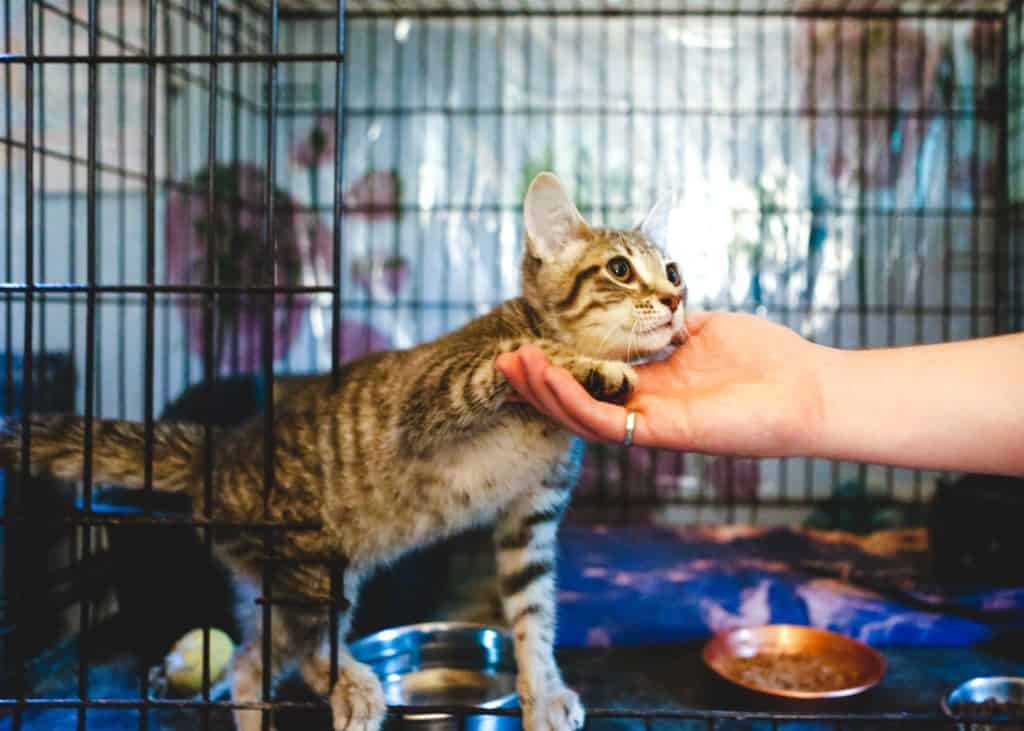
In amongst the snuggles and cuddling, it is important to remember that your kitten is learning one of its most vital skills – how to become a cat during this period. Kittens raised by their mother or a foster cat rely on maternal guidance to teach them how to hunt, use the litter box, socialize and communicate with other cats.
Responsibilities: Kittens 3-6 Month Old
It is around this time frame that your kitten is ready for two things – adoption and neutering. Of course, if you plan to keep the kitten yourself, you need not worry about adoption. It’s important to remember that kittens are learning lots of vital cat skills from their mother, so don’t remove or place them up for adoption until at least after the 10-week mark.

This will give them the best opportunity to grow into happy, well-adjusted felines. Kittens are ready to be neutered and spayed around the 6-month mark, and this should be done if you aren’t planning on having lots of future kitties running around.
Responsibilities: Kittens 6+ Months
Congratulations! If you have followed all the above advice, you should be looking at a beautiful, happy and healthy kitten ready for a life of fun and love. A 6-month-old kitten will need to have small, frequent meals available to them throughout the day.
Try to ensure that you expose your kitten to various foods and flavors so that they don’t become picky as an adult. Your kitten will be highly energetic and will want to run, play and cuddle. As they grow, they will continue to become curious, so try to make sure they have access to some social element, making them friendly and outgoing cats.
Other Frequently Asked Questions About Kittens
Can Kittens Be Left Alone During The Day While I Work?
This will totally depend on the kitten’s age, but in general, it’s ok to have a full-time job and still be able to leave your kitten at home. Since most cats sleep anywhere from 13-16 hours a day, they will likely spend the majority of it happily snoozing. However, it’s worth taking a few precautionary measures to ensure the well-being of your kitten.
You should provide easy access to food, water, and some toys/fun activities around the home. Additionally, you should cat-proof your house if you haven’t already to ensure their safety when you’re gone. Try to remember that cats are very independent animals and won’t mind being alone while you are out of the house for periods at a time.
What Do You Do With a Kitten At Night?
If your kitten is between 8 weeks to 4 months, leaving your kitten alone at night is not advisable. This does not mean that you should take the kitten to bed with you, as this could also be dangerous both for you and the kitten.
Cats carry some diseases that are transmissible to humans, and furthermore, you risk injuring the kitten in your sleep. If you plan to be away for the night or out of town, it is highly advised you contact someone and ask them to watch over your kitten.
If you stay at home, you should make regular checkups on your kitten every few hours to ensure they are safe and sound. It is advised that you try to play with your kitten before bedtime to tire them out and usher them to sleep, or even to give them a late meal as kittens will go to sleep to help with digestion.
How Many Kittens Should I have? Can I have One Kitten?
There is no definitive number regarding the number of cats or kittens one should have. There is always a threshold, though, and only the owner will know when they have reached the point at which they cannot care adequately for the kittens. Usually, the general rule is to not have more kittens/cats than a household that has arms.
While getting one kitten is fine but, believe it or not, having one is a lot more work than having two kittens. 2 kittens are recommended so that both kittens have some company and can play. Science backs this belief too, kittens that grow up with other kittens/cats are generally much less stressed and with less negative behavioral traits as they get older!
This is especially prudent if you are going to be at work for long hours and will reduce the loneliness factor for your kittens. Additionally, having only one kitten will require you to correct their behaviors, and they run the risk of getting single-kitten syndrome!
Although kittens are adorable, and there may be a desire to have many of them, please be aware of your own limitations as a caregiver and consider how adequately you can care for each kitten. As another general rule, don’t get more cats than there are arms in the home.
What’s The Difference Between Adopting a Kitten & Adopting an Adult Cat?
Kittens require a lot more time, energy, and expenditure in the first year of their life. You will find that you make a lot more frequent trips to the veterinarian to check on the progress of your kitten, so make sure you have budgeted for that. Sometimes the cost of vet bills can spiral and become quite costly.
This is something you should prepare for in advance. Generally, after the first year of their life, you will find that the cost reduces as they grow into a happy and healthy adult cat that needs checkups now and then, as advised by your veterinarian.
With regards to adult cats, they are more suited to a busy, working family. They require less maintenance than a kitten but should always receive the same amount of love and care. An older cat may be better if you have young children as they will be more used to being picked up and petted than a kitten. It’s worth bearing in mind that kids might accidentally hurt a kitten which may scratch or bite if it’s frightening.
Can I Raise a Kitten in an Apartment?
You can absolutely raise a kitten in an apartment. However, it’s best to initially designate one room in your apartment as your kitten room. This should be a safe space where your kitten can roam and play. As your kitten matures, you can start to open up the rest of your apartment for it to explore.
Ideally, your kitten room should be larger than a closet and have both an entrance and exit so that your kitten can come and go as it pleases. It should be a safe, warm and secure spot. If you have young children, try to discourage them from going in all the time until your kitten has matured a bit.
Ensure that your kitten has toys it can play with, as well as easy access to a litter box. It’s worth noting that a lot of landlords are more lenient with regards to keeping cats in an apartment than they are with dogs, so keep this in mind when choosing a pet if you live in an apartment as well.
